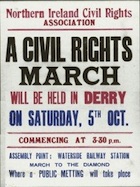
By Eamonn McCann
There will be a civil rights march in Derry on October 5.
The march will assemble at 2.30pm at Waterside Station and proceed along Duke Street, Craigavon Bridge, Carlisle Road, the Diamond and Shipquay Street to Guildhall Square, where prominent speakers will address a rally.
It has been explained to Sinn Fein and the DUP that any ban on the march will be defied.
Some say it’s always wrong to break the law. But when a law is undemocratic and has been introduced in an underhand way, and when the parties behind the measure show disdain for anyone choosing to object, then, it can be argued, defiance is not just a permissible tactic but a democratic imperative.
It will be recalled that the proposed Public Assembly, Parades and Protests Bill emerged from the DUP-Sinn Fein Hillsborough talks last February on devolution of policing and justice. The abolition the Parades Commission was the DUP’s price for agreement.
So, a working group to devise a new parades mechanism was established under the auspices of the Office of First Minister and deputy First Minster, comprising Nelson McCausland, Stephen Moutray and Jeffrey Donaldson (DUP) and John O’Dowd, Michelle Gildernew and Gerry Kelly (Sinn Fein). The draft legislation drawn up by these six was published on April 20.
The group’s mandate had been to deal with contentious parades. But the proposal they came up covered public meetings of all sorts. “Public meeting” was defined as “a meeting of 50 or more persons held in a public place to which the public or a section of the public are invited to attend”.
An OFMDFM “explanatory guide” specified the sort of gathering the law had in mind: “If a group wanted to protest against the closure of a local sports facility, this...would fall under the definition of a public meeting” — and thus would require notice of 37 working days.
There is provision in “extreme emergency” for applications to be lodged within three working days. Organisers “must leave a copy of the notice with a member of the PSNI not below the rank of sergeant”.
This officer must refer the application to the chief constable who in turn must ensure that it is referred to a proposed new 11-member Public Assemblies, Parades and Protests Body, five of whom will meet and issue a directive.
Recent gatherings which would have fallen foul of the proposed new law include the instant protests against the Israeli attack on Gaza in December 2008, the walkout and meeting at Visteon in Belfast after the announcement of the factory’s closure, the demonstrations against violence against Roma in south Belfast last year and car-park protests against the closure of A&E departments.
Under the DUP/SF proposals, any member of the PSNI could arrest without warrant anyone suspected of breaching the law by going ahead with such events.
Conviction of such an offence could result in jail terms of up to six months and fines of up to £5,000. This represents a serious assault on the right of assembly which wouldn’t have been out of place in the old Special Powers Act which the first civil rights movement managed to get rid of.
The main response of Sinn Feiners to criticism of the draft has been to accuse objectors of having no concern for nationalist communities living in apprehension of Loyal Order parades.
In a discussion on Hearts and Minds, John O’Dowd was explicit that the provision for 37 working days notice had been inserted at the urging of residents’ groups. This wouldn’t begin to justify the extension of the provision to public meetings: and anyway, it’s not true.
It emerged at a public meeting in the Bogside last week that the local residents’ group had had no input into the draft. This week, Garvaghy Road and Lower Ormeau residents groups issued a joint statement declaring that, “Far from solving the issue caused by contentious parades in Portadown, south Belfast and elsewhere...the Bill creates a whole new range of problems...Instead of specifically dealing with the minority of marches that are problematic, the new legislation proposes to treat all parades and outdoor gatherings as if they were the same...Those responsible for the bill should go back to the drawing-board to create a workable solution based on common sense and human rights.”
Sinn Fein appears taken aback by the hostility of response to the proposal. (The DUP has, wisely perhaps, kept its head down and its lip buttoned.) The indications are that the party will bow to the pressure and back off when the draft comes before the OFMDFM Assembly committee.
If they are reading the runes right, they will already be on their bikes perfecting their back-pedalling technique.
That stuff about a civil rights march on October 5 if the proposal hasn’t been binned? Not a joke.
![[Irish Republican News]](https://republican-news.org/graphics/title_gifs/rn.gif)
![[Irish Republican News]](https://republican-news.org/graphics/title_gifs/harp.gif)

